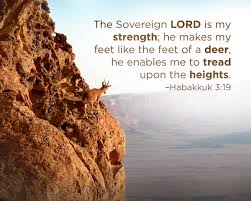Wickedness leads to judgment
Last week we were introduced to Habakkuk the prophet. Habakkuk lived and prophesized in the reign of king Manasseh, when wickedness abound. Destruction by the Chaldeans was imminent. God would use them as an instrument of His judgment.
If God were to assess the moral condition of our nation, would we be prepared to receive His punishment? Last week, we listed the “sins of Judah” that resulted in its fall. Disobedience is a slippery slide that leads to a continuum of sins (James 1:13-15).
What’s in a name?
Before being taken into captivity, Judah would experience the loss of all its material wealth and property. All the blessings of God (Deut. 28:1-14) would be eliminated because of the wickedness and rebellion of Judah (Deut. 28:15-68).
How was Habakkuk to respond to God’s pending punishment on the nation of Judah? Habakkuk is an unusual name which means “to embrace or cling”. In the final chapter of this book, his name becomes apparent as Habakkuk chooses to cling firmly to God regardless of what happens to his nation.
Although and yet. These two conjunctions reflect how devoted Habakkuk was to his God and the trust he would need to navigate through the dark days that lie ahead.
Habakkuk’s declaration
In the final chapter of the book, Habakkuk concludes with a prayer confessing his continuing trust in the rightness of God’s dealing with Judah (Hab. 3:17-18).
Though the fig tree may not blossom,
Nor fruit be on the vines;
Though the labor of the olive may fail,
And the fields yield no food;
Though the flock may be cut off from the fold,
And there be no herd in the stalls—
Yet I will rejoice in the Lord,
I will joy in the God of my salvation.
May I digress and spend a moment on the grammar Habakkuk used in this prayer. Though is a conjunction meaning “in spite of the fact that”. When used at the beginning a phrase, clause, or sentence, it offers a contrast to the main sentence. Yet is also conjunction that means, in this context, “nevertheless.” What are you saying, Habakkuk? Put it in 21st century language we can understand!
In spite of rising costs and inflation,
And drought burned crops and dying cattle in the fields,
In spite of fires, floods, and ravaging storms,
And our shrinking GNP and personal investment accounts,
In spite of doing more with less
And receiving little in return
Nevertheless, I will rejoice in my Lord!
I will be joyful and trust in God.
He is my salvation!
That is the kind of faith we need today. Our world continues to shift from the familiar to the unrecognizable. These lead to uncertainty and fear. How will we respond? Take a moment and write your own declaration of faith. What is your “in spite of” and your “nevertheless”?
Habakkuk’s faith
Habakkuk concludes his prayer by living up to his name. He praises God’s wisdom even though he doesn’t fully understand God’s way. Habakkuk chooses to cling firmly to God regardless of what happens to his nation.
That faith and trust is captured in his closing statement (Hab. 3:19, NLT):
The Sovereign Lord is my strength!
He makes me as surefooted as a deer,
able to tread upon the heights.
In the King James version of this verse, two different words are used for “make”.
- “He will make my feet like hinds’ feet” or “to transform into”.
- “He will make me to walk upon my high places” or “tread, bend, or march”.
The deer in this verse was not the domesticated goat we see on farms today but was a wild mountain goat that was equipped the move through the rugged terrain of the mountains. Narrow openings and ledges, crooks, and jagged rocks. This is where the deer lived, yet they moved confidently knowing they were created for that world.
Application for us. Our sovereign God has created us for such a time as this. He is transforming us and bending us so that we will be able to not only survive but thrive. But our ability to walk upon “our high places” is dependent on our faith and trust in God—even if we don’t understand His ways. We must live by faith (Hab. 2:4). If we do, then we too will be able to walk on our high places (Hab. 3:19).

